The lawsuit against sexist magazine covers of the Stern makes the incipient fight against pornography popular. Autonomous feminists and traditional women’s politicians are looking for personal exchange.
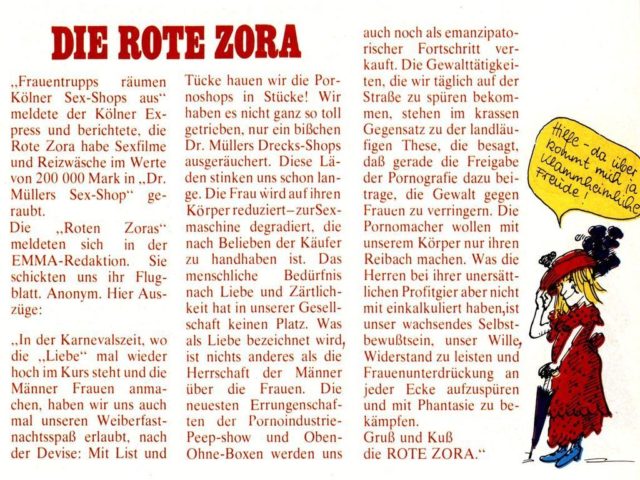
January 1978
Rote Zora attacks six Dr. Müller’s Sexshops in Cologne and robs porn articles worth 100,000 Mark. In an anonymous flyer, the militant group committed to the goals of the autonomous women’s movement states: „These stores have provoked us for a long time. The woman is reduced to her body – downgraded to the sex machine, which can be made use of in whatever way the buyer likes. With cunning and trick, we cut the pornoshops to pieces!“
January 7, 1978
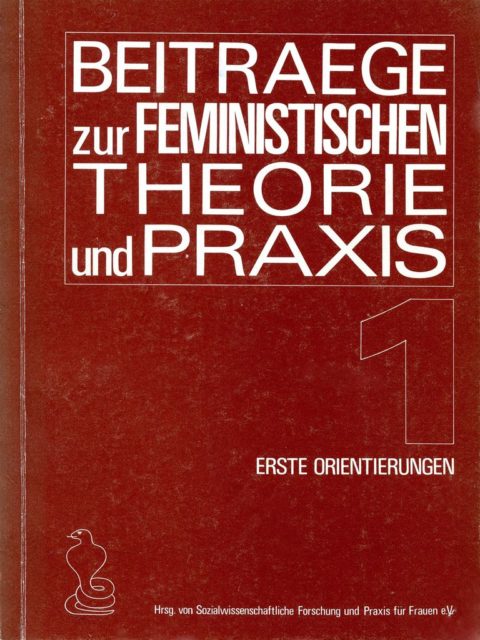
The first women’s helpline opens in Berlin. According to the American model – in the US feminists have not only set up 24-hour helplines, but also so-called ‚Rape Crisis Centers‘ – around 40 women have initiated the helpline for raped women. They can be reached around the clock via an emergency number. They also announce that raped women are being supported on the way to the police, courts and doctors.
February 12, 1978
Social scientists found the Verein Sozialwissenschaftliche Forschung und Praxis für Frauen in Darmstadt. „Professional discrimination against social scientists – this includes all disciplines that deal with social sciences – must be made public, as well as the denial of feminist research projects and learning content.“ The association begins with the establishment of women’s archives at the universities and in the same year publishes the first edition of the Beiträge zur feministischen Theorie und Praxis.
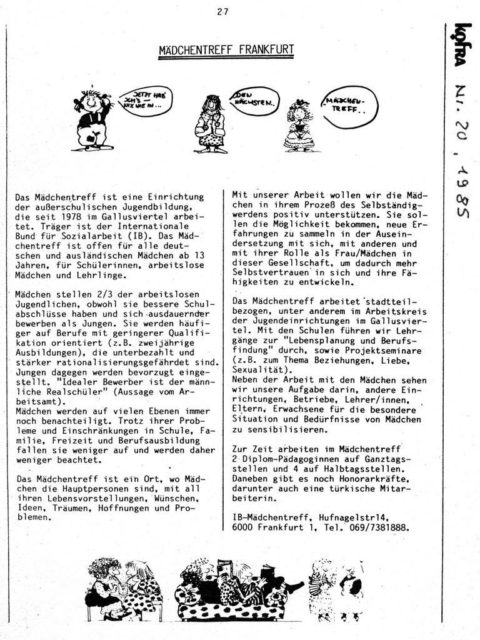
March 8, 1978
The first girls‘ club opens in Frankfurt. It is open to „all German and foreign girls from 13 years, for female pupils, unemployed girls and female apprentices.“ Treated topics are „relationships, love, sexuality“, but also the difficult situation of girls in the labor market: „Girls make up 2/3 of the unemployed youths, even though they have better qualifications and are more persuasive than boys. They are more often oriented toward lower-skilled jobs that are underpaid and more at risk of rationalization.“ The girls‘ club also wants to „make other institutions, businesses, teachers, parents aware of the special situation of girls.“ The feminist work of girls begins.
March 10-12, 1978
In Frankfurt, around 300 women will meet for the congress „women’s movement and repression„. The participants discuss the status quo and the perspectives of the women’s movement against the backdrop of terrorism and criminalization.

For the first time, the „retreat of the women’s movement“ is being discussed. The Women ’s Center Cologne complains: “ The desolate situation in the women‘ s centers can be characterized by an inextricable dissolution in individual actions and initiatives. Women withdraw from the group work with resignation or disillusionment. The clear cohesion during the initial phase of the women’s movement, which originated in the § 218 campaign, does no longer exist in the same form today.“
April 1978
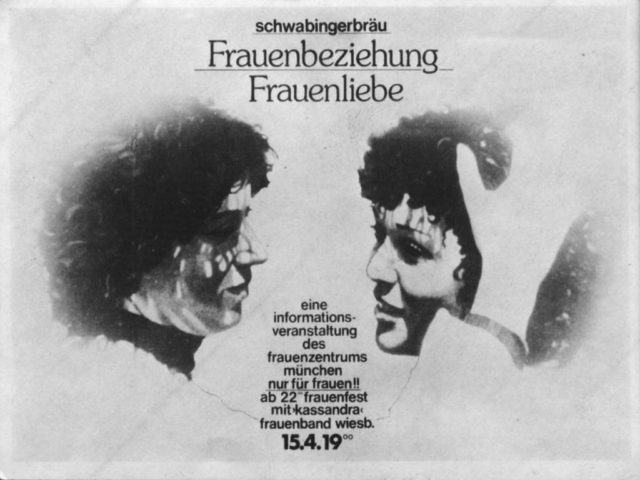
The magazine EMMA publishes a dossier on ‚The crime nobody is talking about‚. For the first time in the German-speaking world, the topic of sexual abuse, which was hitherto completely taboo, is addressed. The report triggers the first Wildwasser groups against sexual abuse.
April 15, 1978
In Munich’s Schwabingerbräu, the Frauenzentrum München invites to an information event on ‚Frauenbeziehungen – Frauenliebe‘. It is a reaction on a hate campaign in the USA with which the Christian-fundamentalist actress Anita Bryant from Florida mobilizes against homosexuality. Bryant’s hate against the „homosexual sinners“ draws circles, even to Germany. The topics of the Munich event are: ‚Lesbians and women’s movements‘, ‚Female and male homosexuality‘ or ‚How do we as lesbians experience the work situation?‘
April 20, 1978
The Arbeitsgemeinschaft sozialdemokratischer Frauen (AsF)initiates a roundtable discussion in Bonn titled ‚women of the party and feminists’. After the ‚Berlin Women’s Conference‘ of September 1977, there is now a further public rapprochement between traditional women’s politicians and representatives of the autonomous women’s movement.
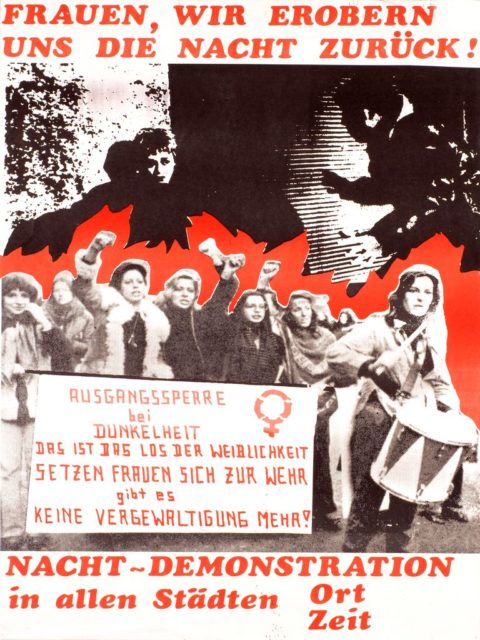
April 28-30, 1978
On initiative of the Cologne Women’s Center, delegates from the Women’s Centers are organizing a national tribunal „Violence against Women“. The „catalog of violence“ set up by the initiators ranges from „violence in marriage“ to „fashion and beauty terror“ to „male-oriented language development“.
April 30, 1978
For the second time thousands of women in many cities in Germany protest against violence against women in the ‚Walpurgisnacht‘. In the following years the protest night will become a tradition.
June 1978
An editorial by Alice Schwarzer on ‚Women Into the Military?‘ triggers a heated debate within the women’s movement and leftist groups. Schwarzer argues for topical reasons that there the right to conscientious objection („I would be a conscientious objector“) that women do not have because they are excluded from military service in the name of the ’nature of the woman‘. The declared pacifist demands, in the name of equality, the full voluntary access of women to the military.
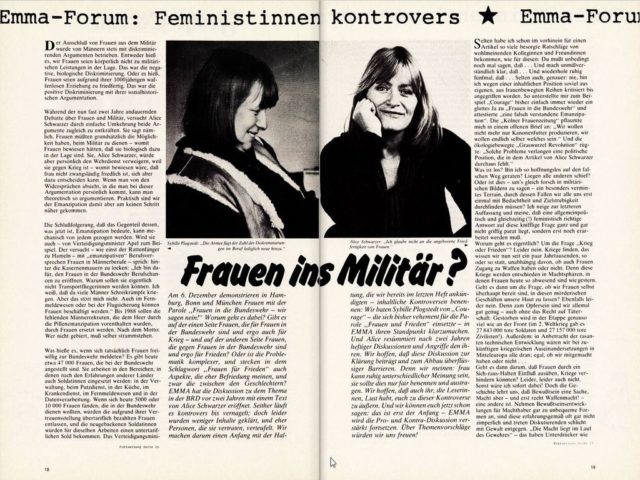
Big excitement follows because the commentary appears at a time when the ’natural peacableness‘ of women is consensus in large parts of the women’s movement. A DKP-close group of women starts the initiative “women in the Bundeswehr – no thanks!” Courage-maker Sybille Plogstedt takes position against Alice Schwarzer in an article on pros and cons.
June 4, 1978
For the first time in the history of the Federal Republic of Germany a women’s alliance is running for the Hamburg state elections. In the Bunten Liste/Wehrt euch about 30 women’s initiatives have joined together. They argue: „We women no longer watch in silence, as the gentlemen in the major and minor parties mislead our interests.“ In the election program of the Bunte Liste are the demands for deletion of § 218, publicly funded women’s shelters and equal pay for equal work.
The Bunte Liste has historical predecessors. (Lida Gustava Heymann: Frauenlisten – aus eigener Kraft, 1927)
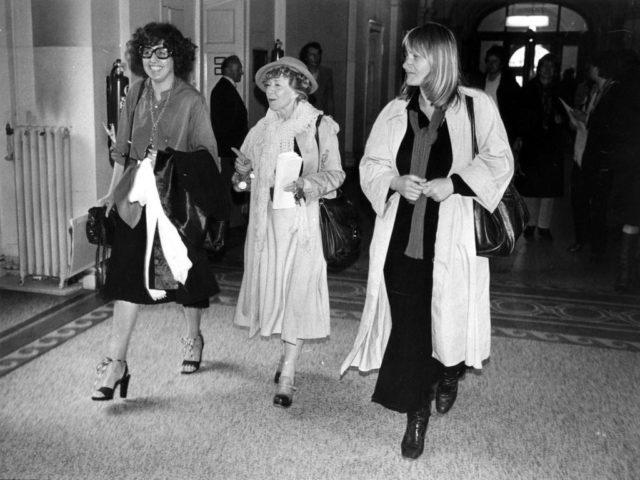
June 23, 1978
In front of the Hamburg district court, Alice Schwarzer and nine other women – including Inge Meysel, Erika Pluhar and Margarete von Trotta – complain exemplary against the sexist cover pictures of the Stern. Your lawyer Gisela Wild claims „to convict the defendants to refrain from insulting the claimants by presenting women on the front pages as mere sexual objects, thereby giving the viewer the impression that the man is free to dispose of and dispose of women dominate. „(Statement of Claim)
This first sexism lawsuit of the Federal Republic is initiated by the magazine EMMA. The German Women’s Council, the umbrella organization of women’s associations with six million members, joins the initiative.
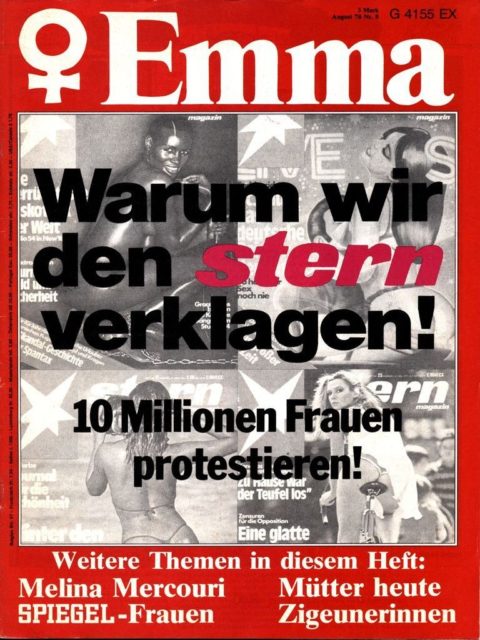
Stern-publisher Henri Nannen accuses the „joyless gray skirts“, ie: the plaintiffs, of having a „fixation on being objectified“, in solidarity Spiegel editor Rudolf Augstein diagnosed „annoying self-pity“ in the plaintiffs. A differentiated article by Spiegel Head of Department Hellmuth Karasek is taken out of the magazine in last minute by the publisher.
The charges are dismissed. However, the court justified the rejection purely formal. On the political concerns of the plaintiffs judge Engelschall stated the opinion of the court: „The Chamber does not fail to recognize that it may be a legitimate concern, to demand a representation of the women image in public and in particular in the media which is adequate to the true position of women in society. And: „In 20 or 30 years, the plaintiffs may win.“
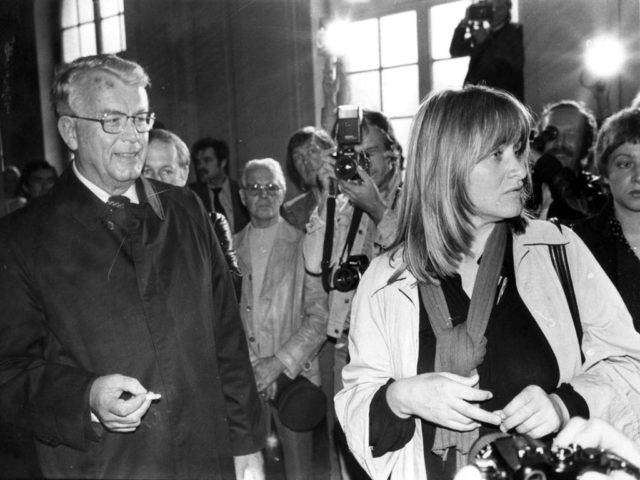
The so-called Stern-lawsuit is a weekly topic in the headlines and contributes significantly to a rise of public awareness of everyday sexism.
July 12, 1978
The Bonn Frauenforum tilts around 2,000 mirror issues in front of the Bonn correspondent office of the Spiegel and lavishes it with green and yellow jellies. The protest is directed against the misogynistic reporting and title design of the magazine, but especially against the „slick slimy commentary“ of the publisher Rudolf Augstein to the star complaint.
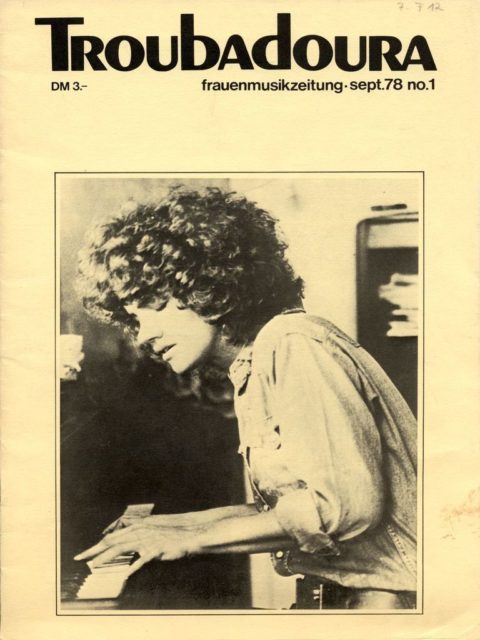
On the same day, around 70 journalists from all over Germany found the Aktion Klartext (AKT) to promote equality for women in the media. Their goals: A more realistic women’s image in the media and more women in committees and leading positions of the media institutions.
September 1978
The first women’s music magazine Troubadoura appears.
October 14-16, 1978
The Verlag Frauenoffensive Munich invites to the 1st International Conference of Feminist Publishers. 30 participants from five countries discuss networking and co-productions (report). At this time, there are 20 women’s bookstores and women’s book distributors in Germany.
![Wir wollen nicht mehr nach Holland fahren : nach der Reform des § 218 ; betroffene Frauen ziehen Bilanz. Pro Familia [Hrsg.] Reinbeck bei Hamburg: Rowohlt, 1978. (SE.11.021) Wir wollen nicht mehr nach Holland fahren : nach der Reform des § 218 ; betroffene Frauen ziehen Bilanz. Pro Familia [Hrsg.] Reinbeck bei Hamburg: Rowohlt, 1978. (SE.11.021)](http://frauenmediaturm.de/wp-content/uploads/2018/05/78_15a_TB_ProFamilia_1_1-480x640.jpg)
October 27-29, 1978
The ’secretaries‘ group ‚of the Frankfurt Women’s Center sends out invitations for a „Büroarbeiterinnen-Kongress“ [office workers congress]. 111 participants from all over Germany, Austria and France discuss „resistance in and alternatives to the office“.
November 9-11, 1978
At the Frankfurt Women’s Health Center, around 100 participants from 30 women’s centers will share their experiences with the reformed § 218. Especially in the CDU-governed states and Bavaria, the law is designed particularly rigid: Doctors refuse to issue indications, there are no available hospital beds for abortions. As before, tens of thousands of West German women have to go to Holland for abortion. On the fifth anniversary of the constitutional court ruling that overthrew the Fristenlösung in February 1975, the activists are planning a tribunal (press release).
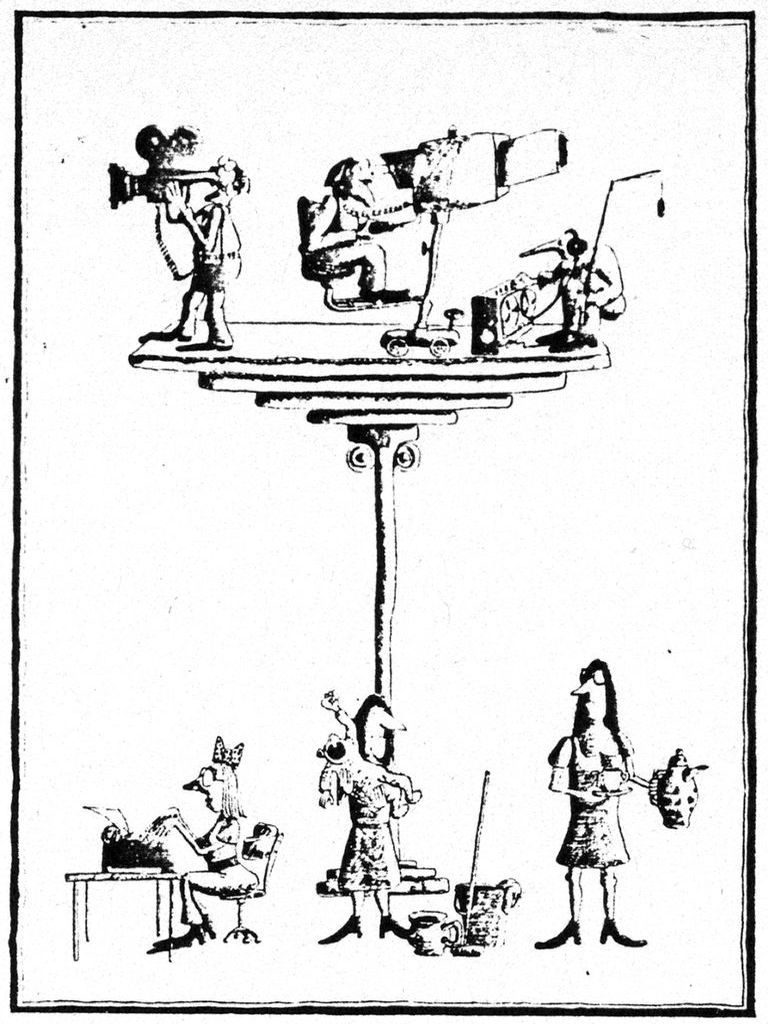
Already in July, Pro Familia Bremen published the book ‚Wir wollen nicht mehr nach Holland fahren’ [We do not want to go to Holland]. „Two years after the revision of § 218, the handling and operation of the law in public has developed into a depressing form of arbitrariness and harassment.“
On November 30, 1975, the deadline solution becomes law in France.
November 18-19, 1978
Around 130 women from media professions come to Frankfurt at the invitation of Aktion Klartext to the autumn meeting Women in the Media. They demand „a true representation of the interests and living conditions of women. The prerequisite for this is that women make and determine programs. “
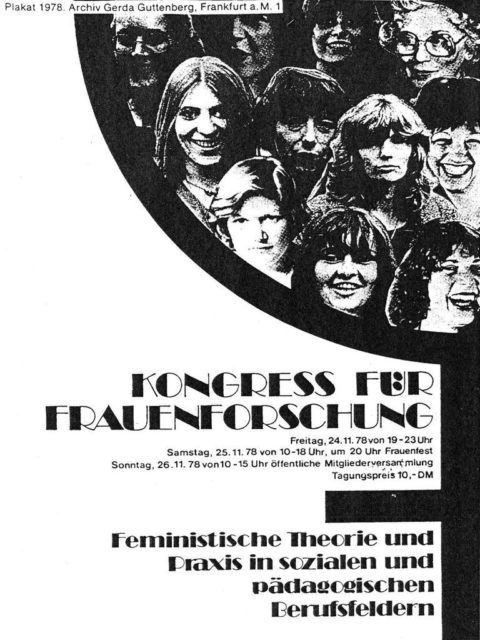
November 24-26, 1978
The Verein Sozialwissenschaftliche Forschung und Praxis für Frauen [Association Social Science Research and Practice for Women] organizes the Congress, Feminist Theory and Practice in Social and Educational Occupational Fields‘. The approximately 1,200 participants exchange their views on ‚Feminist Education in the School‘ or ‚Feminist Practice in Social Education‘.
The Frauenforschungs-, Bildungs- und Informationszentrum [Women’s Research, Education and Information Center], in short: FFBIZ, opens in Berlin. The FFBIZ initiative, which was founded after the ‚Berlin Women’s Conference‘ in September 1977 and is accordingly made up of representatives of traditional women’s associations and the autonomous women’s movement, states: ‚We neither need a new ‚academy of science‘ nor a museum for German history‘. We create the knowledge and write history ourselves.“
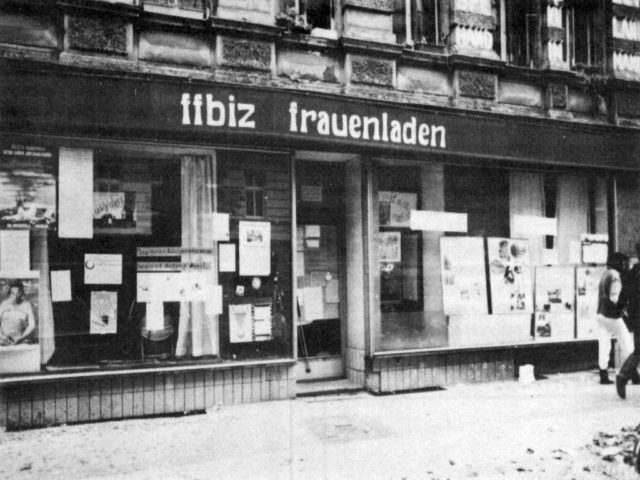
December 7, 1978
The German Press Council supplements its code of honor with the characteristic of gender. From now on it says: „No one may be discriminated against because of his gender, his membership of a racial, religious or national group.“ The self-regulatory body has granted the request of the EMMA editorial board to supplement the press code, which they in the wake of the Stern-lawsuit in June.


